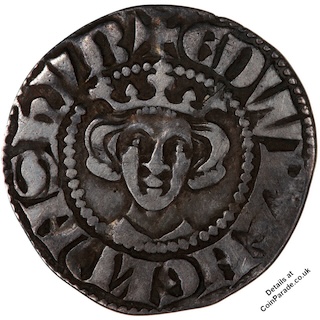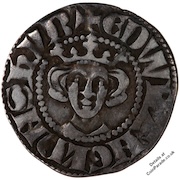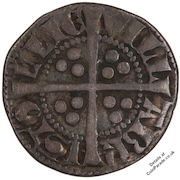
 The 1280-1281 Penny - Class III Bristol Mint - Edward I
The 1280-1281 Penny - Class III Bristol Mint - Edward ISilver penny of King Edward I, minted around 1280-1281 at the Bristol Mint. Diameter 19mm, weighs 1.31g. North: 1022.
The Obverse shows a crowned bust of the King facing. Legend is "+ EDW R ANGL DNS HYB".
Edge is plain.
 The Reverse shows a long cross, with three beads in each angle. Legend around is "VILL A BR ISTO LLIE".
The Reverse shows a long cross, with three beads in each angle. Legend around is "VILL A BR ISTO LLIE".Image credit: Museums Victoria
Mintage: Not known
Minted at Provincial mints
More information (monarch, year, mint, country, category) can be found below coin listings.
Below are some coins currently being offered on eBay. As an eBay Partner, We may be compensated if you make a purchase.
List items on:
List items on:
Edward I (1272-1307)
Classification: Plantagenet King of England. Hammered.Edward was born in June 1239 at the Palace of Westminster, London, first son of Henry III of England and Eleanor of Provence. As a boy he was know as The Lord Edward. He became King on 12 November 1272, known as Hammer of the Scots and Edward Longshanks (as he was 6 feet two inches, which was very tall at that time). He died on 7 July 1307 (aged 68).
The coins of Edward I can be divided in two periods. 1272-1279 was the continuation of the Long Cross Coinage, where all the coins carried the name of Henry III. In 1279, Edward produced 'new coinage' that featured his name and also introduced the halfpenny, farthing and a four pence coin called a 'Groat'.
Category: Penny
The Penny is one of the most famous British coins. The coin itself has been around since 600AD and at various times has been struck in silver, copper and bronze. Originally split into halfpennies and farthing, it is now itself the least denomination coin currently in circulation. Made from copper (actually copper plated steel). Originally there were 12 pennies in one shilling and 240 pennies in £1; since decimalisation in 1971 there are 100 new pence in one pound.
Composition: Early pennies were Silver, then Copper, Bronze and Copper coated steel.
Which Mint: Provincial mints
Not all mints are located in a single place. From the Roman days through to the middle ages it was easier to have local moneyers (trusted people who were allowed to mint coins) rather than make the coins centrally and then have the security and logistics problem of distribution.There were often dozens of mints, sometimes all making the same coin. The variations and mintmarks are exciting for numismatists, although sometimes it takes an expert to analyse them.
Most English Provincial Mints began to close after 1279 when the Royal Mint opened The Tower Mint (called so as it was housed at the Tower of London), although some continued working for much longer. The central mint gave the King and the Master of the Royal Mint much more control over the production and quality of English coinage.
Country of Origin: United Kingdom
The United Kingdom (UK) is the Union of England, Scotland, Wales and Northern Ireland. It is often refered to as Great Britain (GBR). It has a long, rich history. The orignal coinage was Pounds, Shillings and Pence but since decimalisation on 15 February 1971, it is £1 = 100p, that is One Pound = 100 pence. The coinage of the UK is also a long history, the Royal Mint being established as long ago as 886AD when coins were hammered. Today there is perhaps 30 billion coins in circulation, and many (numismatic) collectors coins and sets are issued frequently in gold, silver and other metals.








